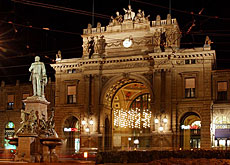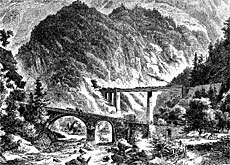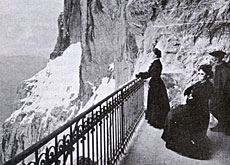Stations were gateways to the world

Switzerland’s main railway stations are a lasting reminder of the golden age of rail travel.
Once modest affairs and little different from stagecoach stops, they soon gave way to soaring buildings and new horizons.
The country’s first railway line, running between Zurich and Baden, opened in 1847.
And while the Swiss at first found themselves chugging behind the rest of the continent, they more than made up for lost time over the next 50 years.
In 1850 Swiss railways carried a million passengers; by the turn of the century this figure had risen a hundredfold.
And the stations springing up around the country in all shapes and sizes were their gateway to the outside world.
Wealthy travellers
A 19th-century traveller entering Zurich’s main station – built in 1871 – passed under a wide arch and could have been forgiven for thinking that he or she could reach any place on Earth.
But the rest of the world wasn’t within easy reach for everybody at that time.
“The first trains carried merchandise and rich tourists, mostly foreigners,” said Kilian Elsasser, the director of Lucerne’s transport museum. “People like you and I could rarely afford a ticket.”
The stations had plenty of facilities for these wealthy travellers, such as a restaurant, a kiosk and, of course, a clock.
The station clock was a minor revolution in the 19th century. Before the railways appeared, each town and village set its own time according to the sun’s position in the sky.
Standard time
It was only after the creation of the Swiss federal state in 1848 that time was progressively unified within the country, and an international time standard only appeared in 1883.
The stations in Basel, Lausanne and St Gallen, built just before the First World War, followed an international trend that led to the construction of massive railway buildings.
“These buildings were the result of negotiations between the Federal Railways and the local authorities,” added Elsasser. “It was a question of prestige, with each town wanting a more beautiful station than its neighbour.”
Built at the same time as many prestigious hotels, these stations were aimed squarely at the same clientele.
Domestic market
But after the First World War, the number of foreign tourists in Switzerland dropped off substantially, and the Federal Railways began to take an interest in domestic travellers.
Ticket prices were cut, giving access to trains to many more people than in the past, and allowing workers to travel from their homes to their workplace and back.
Today, most people use the railways for regional or national travel, and airports – not stations – are the gateways to the rest of the world.
But stations in Switzerland have made a comeback. Increased security and reorganisation have made them safer and friendlier.
Today, they have become not only a place to board a train, but also to meet and shop.
“Our stations are coming back to life,” Elsasser told swissinfo. “It’s important for them to be a focal point in the city, and not a slum in Geneva, Zurich or Lausanne.”
swissinfo, Marc-André Miserez
The country’s first railway line opened in 1847.
It ran for 23.3km between Zurich and Baden.
The railways were nationalised in 1898.
During July and August, the Swiss Broadcasting Corporation – the parent company of swissinfo – is running a series of programmes on the history of Switzerland’s railway stations.
To coincide with the project, swissinfo will be profiling those in Zurich, Lugano, Locarno and Geneva.

In compliance with the JTI standards
More: SWI swissinfo.ch certified by the Journalism Trust Initiative



You can find an overview of ongoing debates with our journalists here. Please join us!
If you want to start a conversation about a topic raised in this article or want to report factual errors, email us at english@swissinfo.ch.